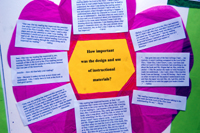". . . that goes into one of the best writings I had. . . my memoir, it wasn't nothing compared to the Lord of the Flies, 'cause like, I don't know, I just, I put time and effort in it and it's like everybody had something to say about the book and Ms. Hogue had us, like, write the packet. I like the packet she made us write because it made me understand. Like I said, when I first read the book I was not having - it was SO boring - but it went on when we had to do the packet I understood it more and then the paper was just like, oh, I get this, and the way she told us to write the paper just made it better. . ." ~ Ashley
"Before, if you gave me Lord of the Flies last semester, like if I didn't take this class, and after I finished it and you asked me, like, what the book was about, I just look at you and say, "I don't know." But my reading improved because I learned to talk to the text so I understand it better and I can explain it." ~ Rasmiya
"My reading has improved because, at first, I can remember that I never even opened the book. I would, like, look at the cover and be like, 'Uh-uh. This is boring. I'm not reading it.' Just because of the picture. And then, like, I would never, like, really pay attention to the book - what it was about, stuff like that. So when we had to do something I be like, 'I don't know what this is about. I don't know what to write.' I used to be lost and Ms. Hogue used to look at me like I was crazy. And then when we read the Lord of the Flies book, like, at first, I didn't want to read it, like. And I was looking at it, like, this was going to be, like, not my type of book. But then she gave us our characters to focus on and stuff like that and that was better because we could, like, focus on one character and getting to know the character. So that was something that I liked."~ Laura
"One way that my reading has improved this semester was when I read Lord of the Flies. Umm, before I read Lord of the Flies I usually, when I read, I used to skip pages and not pay attention to what I was reading. Or sometimes I would just go to the questions and not even read at all. But ever since I started reading Lord of the Flies I started reading through the whole thing and it improved my reading." ~ Jared
"One way my reading has improved this semester is also I read Lord of the Flies, 'cause usually if I had to read a book, I'd just read it straight through and not even get the meaning. But this year when I read the Lord of the Flies I was really able to analyze, you know, what the true meaning of it was - what the theme was - and how it connected to history and everything that's going on in our society." ~ Vladimir
"My reading improved this year because talking to the text made the book Lord of the Flies more understanding for me." ~ Alyssa
"One way my reading was improved was doing the reading packet for Lord of the Flies. I didn't really know how to read certain books because they're hard to understand, but when I was doing the reading packet I understand more about it because I had to talk to the text and explain what I thought was going to happen. I understand more about my character so it made it easier for me to understand it. And then when we went over it in class and you all explained about your characters so it made it a lot more easier because I wasn't not only learning about my character, I was learning about other people's characters more, too, like your attitude about your characters, too, so that's why I think my reading has improved." ~ Chris



